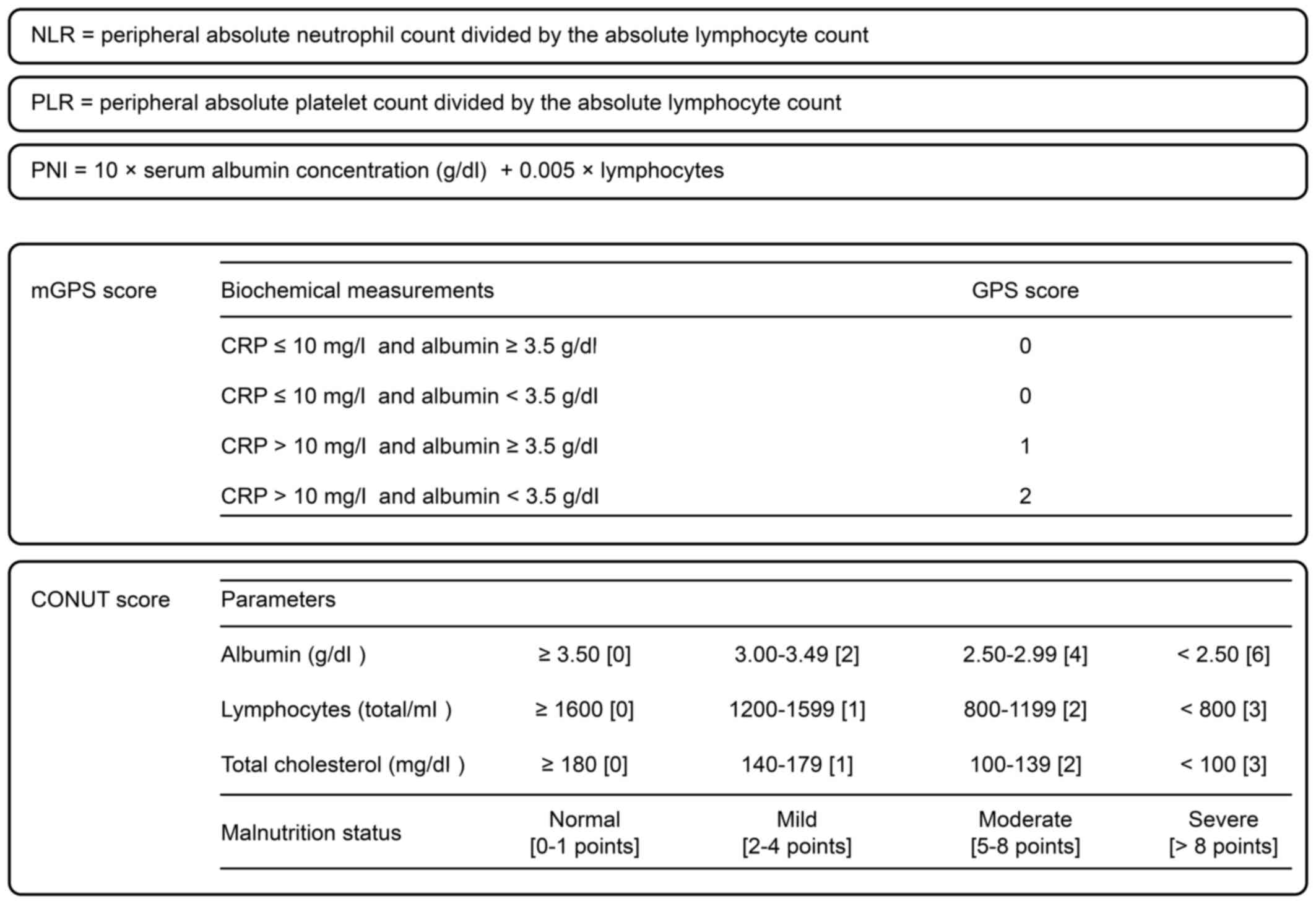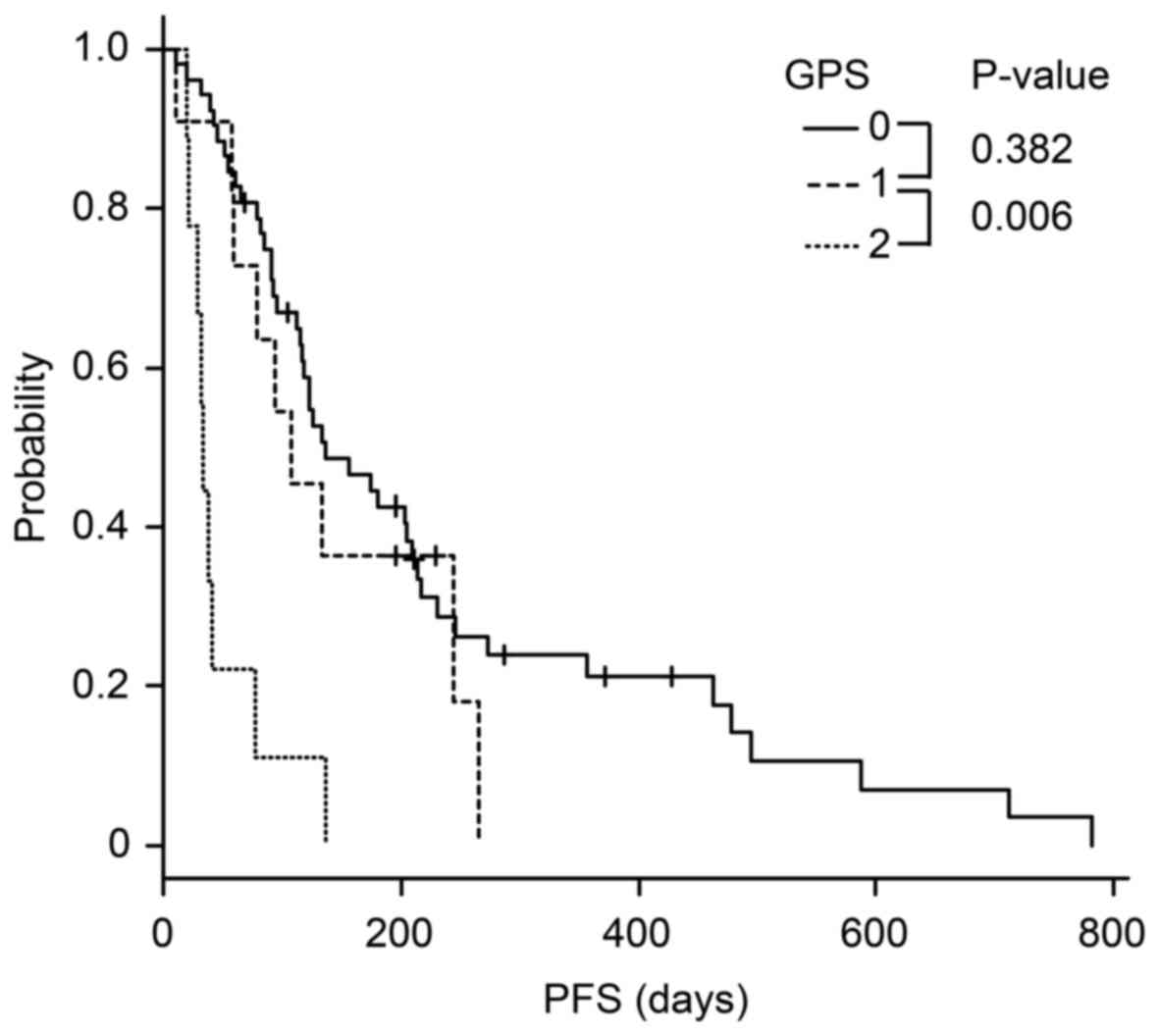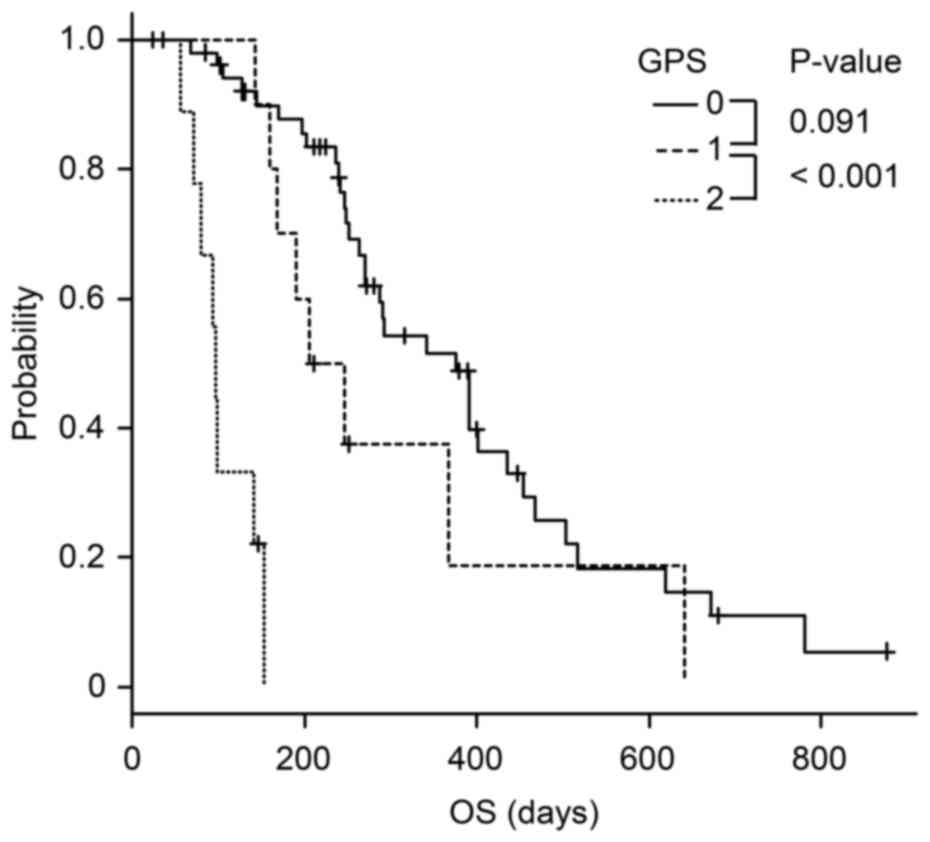|
1
|
Siegel RL, Miller KD and Jemal A: Cancer
statistics, 2016. CA Cancer J Clin. 66:7–30. 2016. View Article : Google Scholar : PubMed/NCBI
|
|
2
|
Zahorec R: Ratio of neutrophil to
lymphocyte counts-rapid and simple parameter of systemic
inflammation and stress in critically ill. Bratisl Lek Listy.
102:5–14. 2001.(In English, Slovak). PubMed/NCBI
|
|
3
|
Walsh SR, Cook EJ, Goulder F, Justin TA
and Keeling NJ: Neutrophil-lymphocyte ratio as a prognostic factor
in colorectal cancer. J Surg Oncol. 91:181–184. 2005. View Article : Google Scholar : PubMed/NCBI
|
|
4
|
An X, Ding PR, Li YH, Wang FH, Shi YX,
Wang ZQ, He YJ, Xu RH and Jiang WQ: Elevated neutrophil to
lymphocyte ratio predicts survival in advanced pancreatic cancer.
Biomarkers. 15:516–522. 2010. View Article : Google Scholar : PubMed/NCBI
|
|
5
|
Aliustaoglu M, Bilici A, Seker M, Dane F,
Gocun M, Konya V, Ustaalioglu BB and Gumus M: The association of
pre-treatment peripheral blood markers with survival in patients
with pancreatic cancer. Hepatogastroenterology. 57:640–645.
2010.PubMed/NCBI
|
|
6
|
Lowe EF, Stein M, Woolley T, Waycaster M,
Scroggins B, Acuff R, Smith JT and Lefemine AA: Prognostic
nutritional index: Its usefulness as a predictor of clinical
course. J Am Coll Nutr. 2:231–240. 1983. View Article : Google Scholar : PubMed/NCBI
|
|
7
|
Kanda M, Fujii T, Kodera Y, Nagai S,
Takeda S and Nakao A: Nutritional predictors of postoperative
outcome in pancreatic cancer. Br J Surg. 98:268–274. 2011.
View Article : Google Scholar : PubMed/NCBI
|
|
8
|
Geng Y, Qi Q, Sun M, Chen H, Wang P and
Chen Z: Prognostic nutritional index predicts survival and
correlates with systemic inflammatory response in advanced
pancreatic cancer. Eur J Surg Oncol. 41:1508–1514. 2015. View Article : Google Scholar : PubMed/NCBI
|
|
9
|
Glen P, Jamieson NB, McMillan DC, Carter
R, Imrie CW and McKay CJ: Evaluation of an inflammation-based
prognostic score in patients with inoperable pancreatic cancer.
Pancreatology. 6:450–453. 2006. View Article : Google Scholar : PubMed/NCBI
|
|
10
|
Imaoka H, Mizuno N, Hara K, Hijioka S,
Tajika M, Tanaka T, Ishihara M, Yogi T, Tsutsumi H, Fujiyoshi T, et
al: Evaluation of modified glasgow prognostic score for pancreatic
cancer: A retrospective cohort study. Pancreas. 45:211–217. 2016.
View Article : Google Scholar : PubMed/NCBI
|
|
11
|
Ignacio de Ulíbarri J, González-Madroño A,
de Villar NG, González P, González B, Mancha A, Rodríguez F and
Fernández G: CONUT: A tool for controlling nutritional status.
First validation in a hospital population. Nutr Hosp. 20:38–45.
2005.
|
|
12
|
Iseki Y, Shibutani M, Maeda K, Nagahara H,
Ohtani H, Sugano K, Ikeya T, Muguruma K, Tanaka H, Toyokawa T, et
al: Impact of the preoperative controlling nutritional status
(CONUT) score on the survival after curative surgery for colorectal
cancer. PLoS One. 10:e01324882015. View Article : Google Scholar : PubMed/NCBI
|
|
13
|
Suzuki R, Takagi T, Hikichi T, Konno N,
Sugimoto M, Watanabe KO, Nakamura J, Waragai Y, Kikuchi H, Takasumi
M, et al: Derived neutrophil/lymphocyte ratio predicts gemcitabine
therapy outcome in unresectable pancreatic cancer. Oncol Lett.
11:3441–3445. 2016. View Article : Google Scholar : PubMed/NCBI
|
|
14
|
Kanda Y: Investigation of the freely
available easy-to-use software ‘EZR’ for medical statistics. Bone
Marrow Transplant. 48:452–458. 2013. View Article : Google Scholar : PubMed/NCBI
|
|
15
|
Garcea G, Ladwa N, Neal CP, Metcalfe MS,
Dennison AR and Berry DP: Preoperative neutrophil-to-lymphocyte
ratio (NLR) is associated with reduced disease-free survival
following curative resection of pancreatic adenocarcinoma. World J
Surg. 35:868–872. 2011. View Article : Google Scholar : PubMed/NCBI
|
|
16
|
Song W, Tian C, Wang K, Zhang RJ and Zou
SB: Preoperative platelet lymphocyte ratio as independent
predictors of prognosis in pancreatic cancer: A systematic review
and meta-analysis. PLoS One. 12:e01787622017. View Article : Google Scholar : PubMed/NCBI
|
|
17
|
Shirai Y, Shiba H, Sakamoto T, Horiuchi T,
Haruki K, Fujiwara Y, Futagawa Y, Ohashi T and Yanaga K:
Preoperative platelet to lymphocyte ratio predicts outcome of
patients with pancreatic ductal adenocarcinoma after pancreatic
resection. Surgery. 158:360–365. 2015. View Article : Google Scholar : PubMed/NCBI
|
|
18
|
Morinaga S, Murakawa M, Katayama Y,
Yamaoku K, Aoyama T, Kanazawa A, Higuchi A, Shiozawa M, Kobayashi
S, Ueno M and Morimoto M: Glasgow prognostic score predicts
clinical outcomes in patients with pancreatic cancer undergoing
adjuvant gemcitabine monotherapy after curative surgery. Anticancer
Res. 35:4865–4870. 2015.PubMed/NCBI
|
|
19
|
Xue P, Kanai M, Mori Y, Nishimura T, Uza
N, Kodama Y, Kawaguchi Y, Takaori K, Matsumoto S, Uemoto S and
Chiba T: Neutrophil-to-lymphocyte ratio for predicting palliative
chemotherapy outcomes in advanced pancreatic cancer patients.
Cancer Med. 3:406–415. 2014. View
Article : Google Scholar : PubMed/NCBI
|
|
20
|
Shimoda M, Katoh M, Kita J, Sawada T and
Kubota K: The glasgow prognostic score is a good predictor of
treatment outcome in patients with unresectable pancreatic cancer.
Chemotherapy. 56:501–506. 2010. View Article : Google Scholar : PubMed/NCBI
|
|
21
|
Yamada S, Fujii T, Yabusaki N, Murotani K,
Iwata N, Kanda M, Tanaka C, Nakayama G, Sugimoto H, Koike M, et al:
Clinical implication of inflammation-based prognostic score in
pancreatic cancer: Glasgow prognostic score is the most reliable
parameter. Medicine (Baltimore). 95:e35822016. View Article : Google Scholar : PubMed/NCBI
|
|
22
|
Ahmad J, Grimes N, Farid S and
Morris-Stiff G: Inflammatory response related scoring systems in
assessing the prognosis of patients with pancreatic ductal
adenocarcinoma: A systematic review. Hepatobiliary Pancreat Dis
Int. 13:474–481. 2014. View Article : Google Scholar : PubMed/NCBI
|
|
23
|
Forrest LM, McMillan DC, McArdle CS,
Angerson WJ, Dagg K and Scott HR: A prospective longitudinal study
of performance status, an inflammation-based score (GPS) and
survival in patients with inoperable non-small-cell lung cancer. Br
J Cancer. 92:1834–1836. 2005. View Article : Google Scholar : PubMed/NCBI
|
|
24
|
McMillan DC, Crozier JE, Canna K, Angerson
WJ and McArdle CS: Evaluation of an inflammation-based prognostic
score (GPS) in patients undergoing resection for colon and rectal
cancer. Int J Colorectal Dis. 22:881–886. 2007. View Article : Google Scholar : PubMed/NCBI
|

















